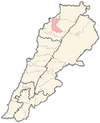Samir Frangieh
Samir Frangieh | |
|---|---|
14 March alliance | |
| Spouse | Anne Mourani |
| Children | 2 |
Samir Frangieh (4 December 1945 – 11 April 2017) was a Lebanese politician and a leftist intellectual. He was a member of the Lebanese Parliament. He was from the Frangieh family, one of the well-known political families of Lebanon.
Early life
Frangieh was born in
Career, activities and views
Frangieh was a leading journalist.[6] He contributed to many leading publications, including L'Orient (1970), L'Orient-Le Jour (1971–1975), Le Monde diplomatique, Libération, An Nahar, As Safir and Financial Times.[1] He also published articles in academic journals such as Journal of Palestine Studies.[7][8]
Frangieh joined the
Frangieh was also one of the founders of the
In the
Frangieh was elected president of the March 14 national council in June 2015 against Fawzi Ferri.[19]
Personal life and death
Frangieh was married to Anne Mourani with whom he had two children.[1] He was the author of The Journey to the Extreme of Violence that was published in 2011.[13] He died on 11 April 2017 in Beirut's Hotel Dieu Hospital.[20][21]
References
- ^ ISBN 978-3-598-07734-0.
- ^ a b Elie Hajj (13 March 2013). "New March 14 Group to Launch in Lebanon Next Week". Al Monitor. Retrieved 14 March 2013.
- ^ "General Election 2005: (14)". Zgharta. 14 June 2005. Retrieved 14 March 2013.
- ProQuest 2305192361.
- ^ Megan K. Stack (19 April 2005). "Lebanon, a House Divided". Los Angeles Times. Retrieved 14 April 2013.
- ^ Gary C. Gambill (Spring 2001). "Is Syria Losing Control of Lebanon?". Middle East Quarterly. 8 (2): 41–49.
- ^ Nathan Eddington McCormack (2012). The sociopolitical foundations of Palestinian Resistance, 1948-1970 (MA thesis). University of Texas at Austin. p. 1.
- JSTOR 2535661.
- ^ a b Charles Glass (4 August 2005). "An Assassin's Land". London Review of Books. 27 (15).
- ^ Charles Glass (1 March 2007). "The lord of no man's land: A guided tour through Lebanon's ceaseless war". Harper's Magazine. Retrieved 29 October 2022.
- ^ "Qornet Shehwan Gathering" (PDF). Middle East Mirror. Archived from the original (PDF) on 5 October 2012. Retrieved 14 April 2013.
- .
- ^ a b "Samir Frangieh: The Orthodox Law insults the dignity of Lebanese Citizens". iloubnan. Beirut. 3 February 2013. Retrieved 14 March 2013.
- ^ "Lebanon". Coincilation Resources. Archived from the original on 16 April 2018. Retrieved 14 March 2013.
- ^ "March 14 warn of bids to link national security to Syria". Lebanon News. 1 April 2012. Retrieved 14 April 2013.
- ^ ISBN 978-0-674-06752-3.
- ^ "Talking To: Samir Franjieh". Now Lebanon. 1 October 2008. Archived from the original on 13 April 2017. Retrieved 14 March 2013.
- ^ Robert G. Rabii (6 June 2009). "Lebanon at the crossroads". Lebanonwire. Archived from the original on 23 March 2013. Retrieved 24 March 2013.
- ^ "Samir Frangieh elected as president of March 14 national council". National News Agency Lebanon. 28 June 2015. Retrieved 17 January 2024.
- ^ "Samir Frangieh passes away at 71". National News Agency Lebanon. 11 April 2017. Retrieved 17 January 2024.
- ^ "Former MP Frangieh dies at 72". The Daily Star. Beirut. 11 April 2017. Archived from the original on 1 May 2021. Retrieved 11 April 2017.
External links
 Media related to Samir Frangié at Wikimedia Commons
Media related to Samir Frangié at Wikimedia Commons

